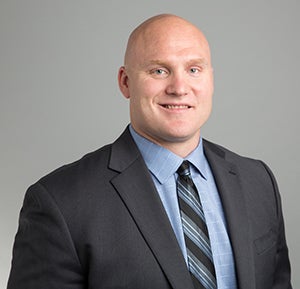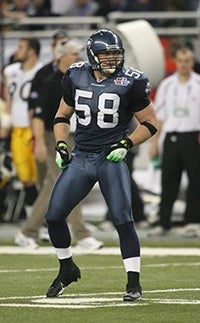 Isaiah Kacyvenski ’00, MBA ’11
Isaiah Kacyvenski ’00, MBA ’11
Environmental Science and Public Policy Concentrator
Leverett House
As a kid, football great Isaiah Kacyvenski ’00, MBA ’11 had never heard of the Super Bowl. And the only thing he knew about Harvard was that his mom liked to wear one of its sweatshirts. After years of hard work on the field and in the classroom, Kacyvenski saw his dream of playing football converge with an opportunity to go to Harvard. Learn how Harvard changed the course of his life—twice—and why the Crimson always has his heart.
Did you always know you wanted to play football?
I started playing on the playground when I was nine years old, and I realized pretty quickly that I was good. Someone asked me, do you watch the Super Bowl? I didn’t know what it was.
No one in my family had ever played a sport, and we didn't have a TV. So I huddled next to the radio that Sunday in 1986, and I listened to the Patriots vs. Bears Super Bowl. I fell in love with the game of football that night. I knew I wanted to play, and that I was going to give it every single thing I had.
How did Harvard become a part of that dream?
I never pictured myself even having the chance to go to Harvard. There was not a lot of formal education in my family, and I grew up in poverty. I worked so hard in school and sports and couldn’t believe that I had a chance to go to a place like this.
I never thought of myself as Harvard material. But Harvard believed in me enough to say that I was Harvard material. And that’s something that I’ll never forget.
How would you describe your journey to Harvard?
Tim Murphy, who is still the Harvard head football coach, reached out to me. I remember telling him that I wasn’t sure it was the place for me or if I would fit in. And he said to me, “Isaiah, you're going to see what Harvard is made of, both inside and outside the football program, and you're going to be surprised.” I took his word for it, came for a visit, and found people from every walk of life and background there. I felt instantly at home.
I understand that you were on financial aid. How did that impact your Harvard experience?
Without financial aid, I would not have been able to attend Harvard. I had no money coming from home, period, whether it was for tuition or day-to-day expenses. Harvard recognized that I was different and unique. Harvard wants these differences and celebrates them in so many ways. To have Harvard say that we're going to make this work for you, Isaiah, that was a blessing over and over again.
You shared that you wanted to be a doctor if you didn’t get into the NFL. What was your concentration at Harvard?
I was pre-med and an environmental science and public policy concentrator. Much like the spirit of liberal arts at Harvard, I wanted a kaleidoscope of different curriculums, and the concentration captured everything from calculus, earth and planetary sciences, physics, biology, and organic chemistry.
I remember taking a physics class with Eric Mazur that blew my mind. He gave us a really complex problem and ending up solving it five or six different ways. It helped me to think about the world in a way that was much more than just rote memorization. It fed my ideas around curiosity and my drive to question everything. I think that's the core of what Harvard is all about.
What was it like to play football for the Crimson?
When I showed up as a freshman on campus, I had a reverse mullet, this red hair, and a broken-down ten-speed bike, and from the first day, I knew I had 110 friends on the team. It gives you a level of camaraderie, of friendship, of confidence that you are not by yourself and you are not alone.
Coach Murphy really believed in me right from the start. In my first game of the season against Columbia, I was named Ivy League Rookie of the Week and I didn't look back.
 After you graduated, you went to play for the Seattle Seahawks, St. Louis Rams, and the Oakland Raiders, and were in Super Bowl XL. When you retired in 2008, you decided to go to Harvard Business School. What was it like to come back to Harvard?
After you graduated, you went to play for the Seattle Seahawks, St. Louis Rams, and the Oakland Raiders, and were in Super Bowl XL. When you retired in 2008, you decided to go to Harvard Business School. What was it like to come back to Harvard?
I remember the first night of business school. It was dead quiet, and I sat down to open my books and realized that I was right back where I started from—it’s just me and a book again. It was humbling and challenging at the same time, and I loved it.
You became an entrepreneur and investor and now work as the global head of development for MC10, a high-tech company that is revolutionizing wearable electronics. Can you share what you are working on?
I’ve been able to bring my interests in biotech, medicine, and sports together at MC10. We make thin and flexible high-performance electronics that can gather data from anywhere on the body. I helped launch the first application, CHECKLIGHT, which measures the force of impact to the head, and in partnership with Reebok, we brought it to market in June 2013.
We are now developing a BioStamp technology, which captures multisensor- and multilocation-based data about the body. For example, let’s say I have an ACL injury. With this wearable technology, we can gather data on my gait, range of motion, and muscle activity. We are starting to use it in researching Parkinson’s disease. It has limitless applications in health care, sports, and consumer wellness, and it will change how you think about your health broadly. I love what I’m doing. And Harvard has been a big part of helping me find a way to live my passions.